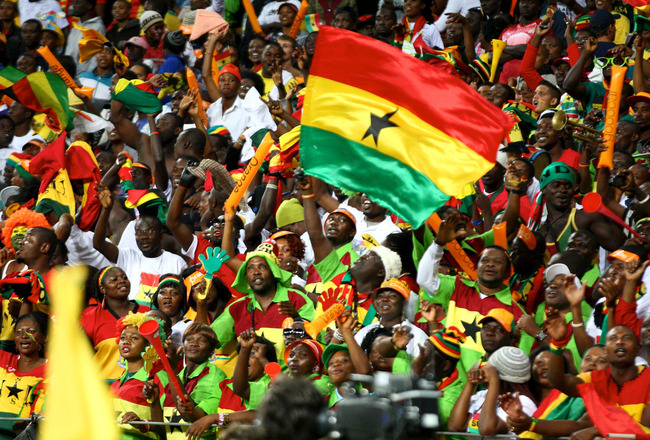 Ghana Freedom is a cult song, known to most Ghanaians under the age of 60 through the recording by E T Mensah made for Ghana's independence in 1957. The tune is irrepressible, but the story behind it is even more irrepressible than most realize. This is a scoop for African history! In 1977, one of the regular readers of this blog unearthed papers in Colonial Office Archive to explain the mystery.
Ghana Freedom is a cult song, known to most Ghanaians under the age of 60 through the recording by E T Mensah made for Ghana's independence in 1957. The tune is irrepressible, but the story behind it is even more irrepressible than most realize. This is a scoop for African history! In 1977, one of the regular readers of this blog unearthed papers in Colonial Office Archive to explain the mystery.He found a clipping from The Morning Telegraph, a Sekondi newspaper, dated 5 February 1952, which states "As an expression of solidarity between Africans of the Gold Coast and people of African descent in the West Indies, Trinidad calypso singers, headed by George Browne have composed a calypso called Freedom for Africa. The new dance song is dedicated to the Honourable Dr Kwame Nkrumah, Prime Minister and Chairman of the Convention People's Party, popularly known as the CPP" ..... "the background music is provided by African drums played by two Gold Coast Natives, Alfred Payne of Accra and Kofi Mensah of Cape Coast. The calypso has an attractive tune and should be popular among dancers as well as among supporters of the CPP". Here are four of the eight verses::
From his Ussherfort Cell, where they bolted the doors so well,
Nkrumah made his clarion call, and the people voted him one and all.
Chorus : Freedom, freedom is in the land, Friends, let us shout, Long live the CPP! Which now controls Africa's destiny.
They called us all the verandah boys, they thought we were just a bunch of toys, But we won the right to vote at midnight hour, came out of jail and took power.
With Appiah the ambassador, Casely Hayford the barrister,
these two gentlemen did quite well, they got us out of the jailhouse cell.
The British MP Gammans was rude, by his dog in the mangerish attitude,
But like the ostrich we know that man can go bury his head in the sand
Apparently several thousand records of the song were to be made and shipped to Africa, but the Colonial Office probably wasn't pleased. In those days, The Crown Agents held a monopoly of all government business and locals weren't supposed to act independently. So if a colony grew cotton, it had to buy cotton textiles from Manchester, via the CA. In a minute preserved in CO554/595 dated 5th January 1952, officials are discussing the activities of men like "Mr Appiah of WASU" (Joe Appiah of the West African Students Union). Making mass copies of a recording which criticized the government would not go down well. No-one really knows what happened to the first pressing of Ghana Freedom, but quiet words may have been said in London, where the master tapes were. Colonialism was sinister and pernicious, even though there were many good idealists, like Selwyn Selwyn-Clarke and Stafford Cripps whose daughter Peggy married Appiah. Their son Kwame Anthony Appiah was professor of philosophy at Princeton and now has a chair at New York University.
The recording is "lost" as far as can be ascertained. Maybe someone has a copy somewhere? George Browne, aka Young Tiger, was also quite a character- here's his obit.
Fortunately, E T Mensah took up the cause. His song Ghana Freedom is the unofficial national anthem, even sixty years later. So the words "Toil of the brave and the sweat of their labours, they have brought results"remind us that independence wasn't an act of kindness on the part of the British. Africans, Indians, Pakistanis and Malays died in order that the idea of freedom would be recognized. Democracy is a responsibility we must honour. Don't take it for granted ! It is not a game.
ET was a qualified pharmacist who worked for the government by day and had a huge career in hilife music at night. As he rose higher, he played less until his retirement, when he went back to hi life. In the months before his death, he was interviewed on TV about the events of 1957. He was then old and sick, but still he remembered the words to the song.
We are "all" Ghana when we celebrate freedom. Nkrumah's government collapsed: Chaos often follows independence, especially where democracy has been so long suppressed that people don't know how to deal with it. But the principle stands : all people have the right to self determination. These days we're facing a retreat from the very concept of democracy, when electors place their faith in demagogues. Extremism is not democracy. Real democracy comes when people take their rights seriously enough to think, evaluate and question. So democracy isn't "orderly" ? Consider the alternative.



